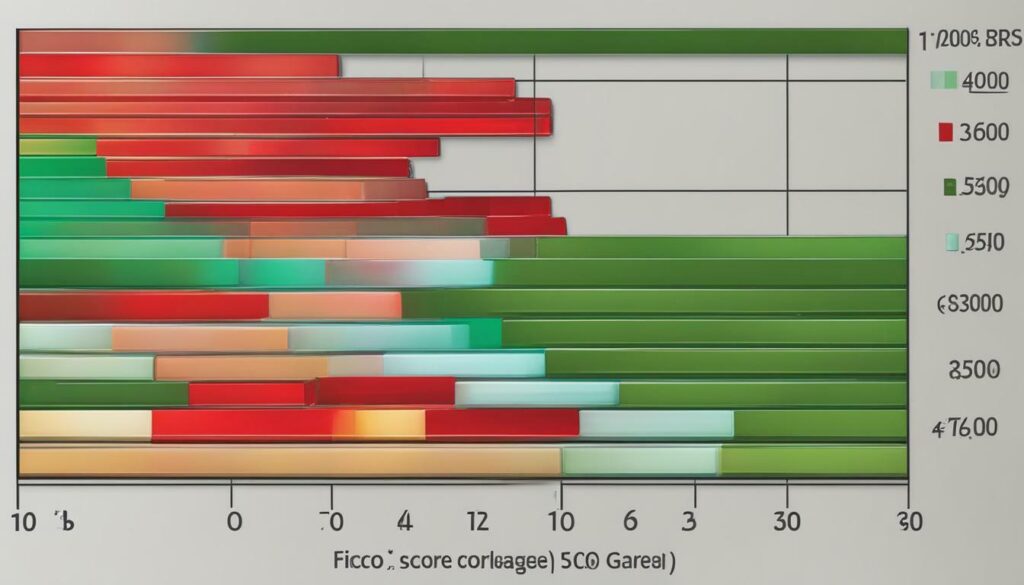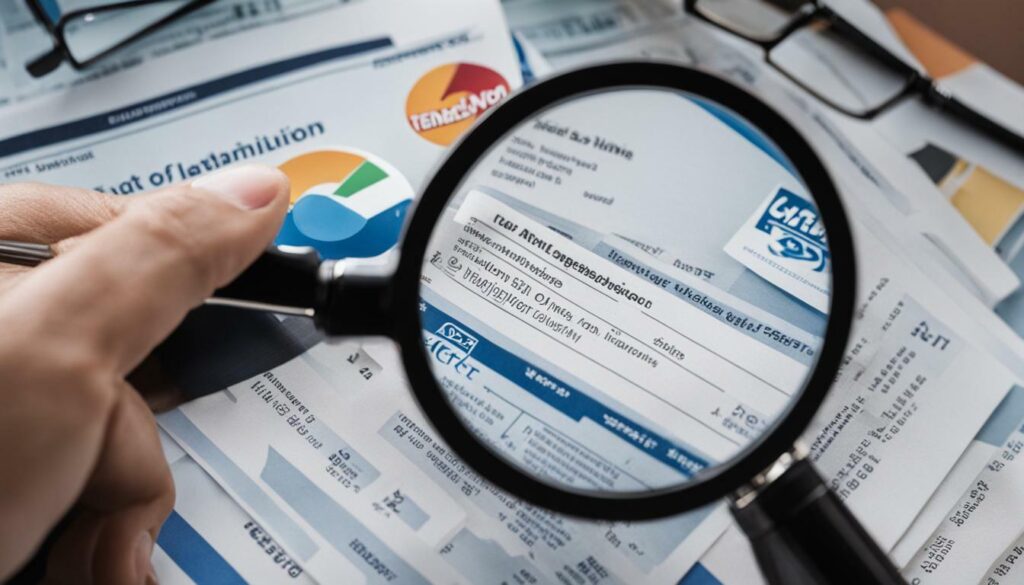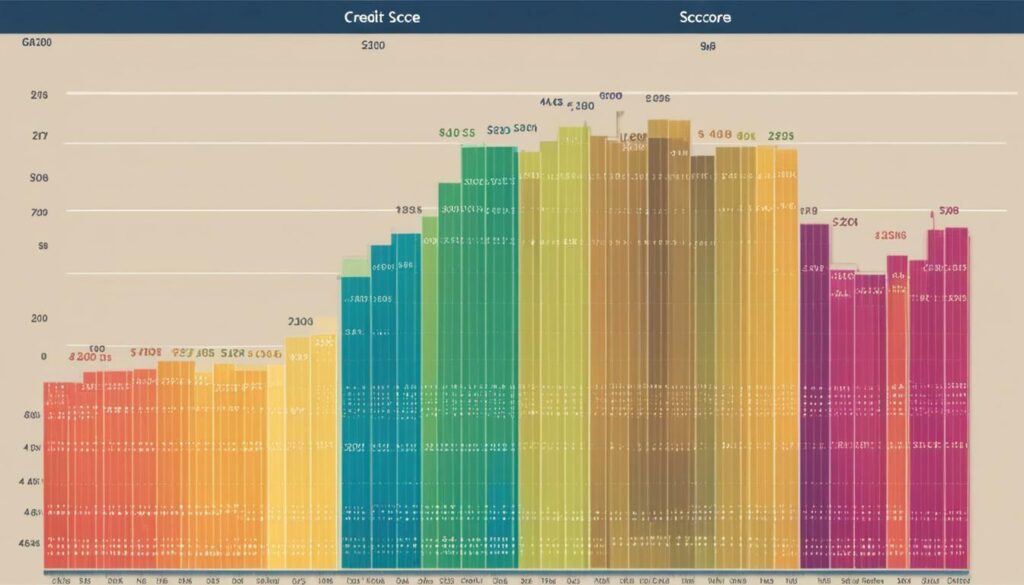Understanding Credit Score Essentials for Potential Homeowners

Aspiring homeowners, your credit score holds the key to unlocking the door to your dream home. Understanding credit score essentials is crucial to enhance your financial standing and secure a mortgage loan. Lenders rely on credit scores, particularly the FICO score, to assess your creditworthiness and determine the terms of your loan.
The FICO score takes into account various factors, including your payment history, amount owed, length of credit history, types of credit used, and new credit. A higher credit score indicates responsible financial behavior and increases the likelihood of loan approval with favorable terms.
On the other hand, a lower credit score may result in higher interest rates and more stringent credit requirements. For example, a FICO score between 740-840 is considered excellent, while a score between 560-620 may result in higher interest rates. It is essential to know where your credit score falls within the range and take steps to improve it if necessary.
When it comes to credit inquiries, there are two types: soft inquiries and hard inquiries. Soft inquiries, such as checking your own credit score, do not impact your credit score. However, hard inquiries, such as applying for credit, can slightly lower your score. It is important to be mindful of the impact that hard inquiries can have and minimize unnecessary credit applications.
For first-time homebuyers, credit score requirements typically range from 620 to 640 for conventional mortgages. However, government-sponsored loan programs, such as Federal Housing Administration (FHA), Veterans Affairs (VA), and U.S. Department of Agriculture (USDA) loans, offer more flexibility and allow for lower credit scores. These programs are designed to help individuals with lower credit scores achieve their homeownership goals.
🚨 TUIC Errors + Low Credit Score?
CreditScoreIQ helps you build credit faster by reporting utility bills to all 3 bureaus—while you dispute errors.
Start Building Credit Today →Improving your credit score is within your control. By setting a budget, making on-time payments, reducing credit card balances, and reviewing your credit reports for errors, you can positively impact your credit score over time. It is essential to establish good credit habits and maintain responsible credit management to strengthen your financial standing.
- Your credit score plays a crucial role in securing a mortgage loan for your dream home.
- FICO scores consider factors like payment history, amount owed, length of credit history, types of credit used, and new credit.
- Aim for a credit score between 740-840 for excellent loan terms, and be aware that lower scores may result in higher interest rates.
- Soft inquiries, like checking your own credit score, do not impact your credit, while hard inquiries, such as credit applications, can slightly lower your score.
- First-time homebuyers typically need a credit score of 620 to 640 for conventional mortgages, but government-sponsored loan programs offer more flexibility for lower scores.
- Improving your credit score is possible by practicing good financial habits and reviewing your credit reports regularly.
The Basics of Credit Scores
Credit scores are a numeric representation of an individual’s creditworthiness, and they are influenced by several key factors. Lenders use credit scores, such as the FICO score, to assess the likelihood of borrowers repaying their debts. Understanding how credit scores work can help potential homeowners navigate the mortgage lending process more effectively.
The FICO score, the most widely used credit scoring model, considers several factors when calculating a borrower’s creditworthiness. These factors include payment history, which accounts for the largest portion of the score, amount owed, length of credit history, types of credit used, and new credit. Payment history reflects an individual’s track record of paying bills on time and carries significant weight in determining credit scores. Amount owed takes into account the total outstanding debt compared to the available credit, and it is advisable to keep credit utilization below 30% to maintain a healthy score.
Length of credit history considers the age of the oldest and newest accounts, as well as the average account age. A longer credit history can demonstrate stability and responsible credit management. The types of credit used assess the mix of credit accounts, such as credit cards, loans, and mortgages. Having a diverse credit portfolio can positively impact credit scores. Finally, new credit reflects recent credit inquiries and account openings. Opening multiple new accounts within a short period may indicate higher credit risk and potentially lower credit scores.
| Credit Score Range | Rating |
|---|---|
| 800-850 | Excellent |
| 740-799 | Very Good |
| 670-739 | Good |
| 580-669 | Fair |
| 300-579 | Poor |
Having a higher credit score can offer several advantages for potential homeowners. It increases the likelihood of loan approval and allows borrowers to access lower interest rates and better loan terms. On the other hand, lower credit scores may result in higher interest rates and more limited borrowing options. It is important for potential homeowners to be proactive in managing their credit scores and take steps to improve them when necessary.
To maintain or improve credit scores, individuals should strive to make timely payments, minimize their credit card balances, and review their credit reports periodically for errors or inaccuracies. It is also crucial to avoid excessive credit inquiries, as hard inquiries can temporarily lower credit scores. By understanding the basics of credit scores and taking proactive steps to manage their credit, potential homeowners can increase their chances of qualifying for a mortgage and securing their dream home.
Factors Affecting Credit Scores
Various factors can impact an individual’s credit score. It is essential to be aware of these factors to maintain a healthy credit profile. Payment history is the most critical factor, accounting for 35% of the FICO score. Making on-time payments consistently is vital to maintaining a good credit score. Amount owed, which contributes 30% to the score, considers the overall debt compared to available credit. Keeping credit utilization low, below 30%, can help improve credit scores.
Length of credit history, contributing 15% to the score, considers the average age of all credit accounts and the time since the last account activity. The longer the credit history, the more positive impact it can have on credit scores. Credit mix, accounting for 10% of the score, refers to the different types of credit accounts a person has, such as credit cards, mortgages, and loans. A diverse credit mix can reflect responsible credit management.
New credit, making up the remaining 10% of the score, concerns recent credit inquiries and account openings. Applying for multiple credit accounts within a short period may indicate higher credit risk and potentially lower credit scores. It is advisable to limit new credit applications when trying to improve credit scores.

Understanding these factors and their impact on credit scores can empower potential homeowners to take proactive steps to maintain or improve their creditworthiness. By managing these factors effectively, individuals can increase their chances of qualifying for favorable mortgage terms and achieving their homeownership goals.
The Importance of Credit Scores for Homebuyers
For potential homebuyers, credit scores play a pivotal role in determining eligibility for mortgage loans and the terms associated with them. Lenders use credit scores, such as the FICO score, to assess the creditworthiness of applicants. A good credit score increases the chances of approval for a mortgage loan and can result in more favorable interest rates and loan terms.
The FICO score, which range from 300 to 850, takes into consideration various factors such as payment history, amount owed, length of credit history, types of credit used, and new credit. A higher credit score indicates a lower risk for lenders, making it easier for potential homebuyers to secure a mortgage loan.
Generally, a FICO score between 740-840 is considered excellent, while a score between 560-620 may result in higher interest rates and less favorable loan terms. It’s important for potential homeowners to understand their credit scores and take steps to improve them if necessary. This can be done by setting a budget, making on-time payments, reducing credit utilization, and reviewing credit reports for any errors.
Credit Score Requirements for Home Loans
When it comes to home loans, credit score requirements can vary depending on the type of loan. For conventional mortgages, a minimum credit score of 620 is typically required for first-time homebuyers. However, there are government-sponsored loan programs, such as FHA, VA, and USDA loans, that allow for lower credit scores.
These loan programs are designed to provide opportunities for potential homebuyers with less-than-perfect credit to fulfill their homeownership dreams. FHA loans, for example, often have more lenient credit score requirements, with some lenders accepting scores as low as 500 with a higher down payment.
It’s important for potential homebuyers to research and understand the credit score requirements for the different loan programs available to them. By knowing the specific requirements, they can determine which loan program aligns with their current financial situation and credit score.
Understanding FICO Scores
FICO scores are widely used by lenders to assess creditworthiness, and understanding their range and requirements is essential for potential homeowners. A FICO score is a three-digit number that represents an individual’s credit risk. It is calculated based on various factors, including payment history, amount owed, length of credit history, types of credit used, and new credit.
When it comes to FICO scores, the higher the better. A FICO score between 740 and 840 is considered excellent, while a score between 560 and 620 may result in higher interest rates and more stringent loan requirements. It’s important to note that each lender may have different credit score requirements, so it’s advisable to check with multiple lenders to understand their specific criteria.
Credit inquiries, or credit checks, also play a role in FICO scores. There are two types of credit inquiries: hard inquiries and soft inquiries. Hard inquiries occur when a lender checks an individual’s credit report as part of the loan application process. These inquiries can slightly lower the FICO score. On the other hand, soft inquiries, such as credit checks for pre-approved offers or personal credit checks, do not impact the FICO score.
Minimum Credit Score Requirements
For first-time homebuyers, a minimum credit score of 620 is typically required for conventional mortgages. However, there are government-sponsored loan programs that allow for lower credit scores. For example, the Federal Housing Administration (FHA) offers loans with a minimum credit score requirement of 500, although a higher score may be required for a lower down payment. Veterans Affairs (VA) loans and United States Department of Agriculture (USDA) loans also have more flexible credit score requirements, making homeownership more accessible for individuals with lower credit scores.
To improve credit scores, potential homebuyers can take several steps. These include setting a budget, making on-time payments, reducing credit utilization, and reviewing credit reports for errors. By practicing responsible credit management habits, potential homeowners can increase their chances of qualifying for better loan terms and achieving their homeownership goals.

Several factors can impact your credit score, and understanding them is key to maintaining a healthy credit profile. Your credit score is a numerical representation of your creditworthiness and is used by lenders to assess your credit risk when applying for a loan or credit card. By analyzing your credit history and financial behavior, credit bureaus calculate your credit score, which can range from 300 to 850.
Payment history is one of the most significant factors affecting your credit score. Making on-time payments consistently shows lenders that you are reliable and responsible with credit. Late or missed payments, on the other hand, can have a negative impact on your score. It’s important to pay your bills on time to maintain a good credit history.
The amount owed is another crucial factor. This refers to the total balance of your outstanding debt compared to your total available credit. High credit utilization, where you’re using a large portion of your available credit, can indicate financial strain and negatively impact your credit score. It’s generally recommended to keep your credit utilization below 30%.

- Payment History: Timely payments demonstrate reliability.
- Amount Owed: High credit utilization can lower your score.
- Length of Credit History: Longer credit history may boost your score.
- Types of Credit Used: A diverse credit mix can positively impact your score.
- New Credit: Opening multiple accounts can temporarily lower your score.
The length of your credit history is also a significant factor. Lenders prefer to see a long credit history as it provides more data to evaluate your creditworthiness. If you’re new to credit, it may take time to build sufficient credit history. Patience and responsible credit management can help you establish a positive credit profile over time.
The types of credit you use can also impact your credit score. Having a mix of credit accounts, such as credit cards, installment loans, and a mortgage, can demonstrate your ability to manage various types of credit. This can positively influence your credit score.
Lastly, applying for new credit can affect your credit score. Each time you apply for credit, a hard inquiry is recorded on your credit report. Multiple hard inquiries within a short period can be seen as a red flag to lenders. However, soft inquiries, such as checking your own credit or pre-approved credit offers, do not impact your score.
By understanding these factors and actively managing them, you can take control of your credit score and work towards maintaining a healthy credit profile. Regularly reviewing your credit report, making on-time payments, and responsibly managing your credit can contribute to a higher credit score over time.
Summary:
In summary, several factors can impact your credit score, including payment history, amount owed, length of credit history, types of credit used, and new credit. Making on-time payments, keeping credit utilization low, maintaining a long credit history, having a diverse credit mix, and avoiding excessive new credit applications are key to maintaining a healthy credit profile. By understanding and managing these factors, you can improve your credit score and increase your chances of obtaining favorable loan terms and interest rates.
Improving Your Credit Score
If you’re looking to boost your credit score, implementing these tips can help you achieve a stronger financial foundation. Your credit score plays a crucial role in determining your eligibility for loans and the interest rates you may be offered. By taking proactive steps to improve your credit score, you can potentially save thousands of dollars over the life of your mortgage.
1. Set a Budget
Creating a realistic budget is the first step towards improving your credit score. It allows you to track your income and expenses, giving you a clear picture of your financial situation. With a budget in place, you can prioritize your spending, pay your bills on time, and avoid unnecessary debt. Consider using budgeting apps or spreadsheets to help you stay organized and on track.
2. Make On-Time Payments
Payment history is one of the most significant factors affecting your credit score. Late payments can have a negative impact on your creditworthiness. To improve your score, make it a priority to pay your bills on time. Set up automatic payments or reminders to ensure you never miss a due date. Over time, consistently making on-time payments will demonstrate your creditworthiness and help boost your score.
3. Review Your Credit Reports
Regularly reviewing your credit reports is essential for identifying errors or discrepancies that may be impacting your score. You are entitled to a free credit report from each of the three major credit bureaus (Equifax, Experian, and TransUnion) annually. Take advantage of this opportunity and carefully review your reports for any inaccuracies. If you find any errors, submit a dispute to the credit bureau to have them corrected.
| Score Range | Credit Rating |
|---|---|
| 800-850 | Excellent |
| 740-799 | Very Good |
| 670-739 | Good |
| 580-669 | Fair |
| 300-579 | Poor |
4. Reduce Credit Utilization
Credit utilization refers to the amount of credit you use compared to your total available credit. High credit utilization can negatively impact your credit score. To improve your score, aim to keep your credit utilization below 30%. Paying down your balances and avoiding maxing out your credit cards can help lower your utilization ratio and improve your creditworthiness.
By following these credit score tips and making positive changes to your financial habits, you can take control of your creditworthiness and increase your chances of securing a favorable mortgage loan. Remember, improving your credit score takes time and persistence, but the long-term benefits are well worth the effort.

When it comes to home loans, specific credit score requirements exist, and it’s essential to understand them to ensure eligibility. Lenders use credit scores to assess an applicant’s creditworthiness and determine the terms of the loan. For first-time homebuyers, a minimum credit score of 620 is typically required for conventional mortgages. However, there are government-sponsored loan programs, such as FHA, VA, and USDA loans, that allow for lower credit scores. These programs provide more flexibility in credit score requirements, making homeownership accessible to a wider range of individuals.
| Loan Program | Credit Score Requirement |
|---|---|
| FHA Loans | Minimum credit score of 580 with a down payment of 3.5%, or a minimum credit score of 500 with a down payment of 10% |
| VA Loans | No specific credit score requirement, but most lenders prefer a minimum credit score of 620 |
| USDA Loans | No specific credit score requirement, but most lenders prefer a minimum credit score of 640 |
These loan programs offer an attractive option for potential homebuyers with lower credit scores. However, it’s important to note that a credit score is just one of many factors lenders consider when evaluating loan applications. Other factors such as income, employment history, and debt-to-income ratio also play a role in the approval process.
To improve your credit score and increase your chances of qualifying for a home loan, it’s important to establish good credit habits. Set a budget, make on-time payments, and review your credit reports regularly to identify and dispute any errors. Taking these steps will not only boost your credit score but also demonstrate to lenders that you are a responsible borrower.

“Your credit score is an important factor in determining your eligibility for a home loan. By understanding the credit score requirements and taking steps to improve your score, you can increase your chances of securing the loan you need to buy your dream home.”
Exploring Loan Programs for Lower Credit Scores
If your credit score falls below the typical requirements for conventional mortgages, these loan programs could be viable options for you. The Federal Housing Administration (FHA), the Department of Veterans Affairs (VA), and the United States Department of Agriculture (USDA) offer loan programs specifically designed to help individuals with lower credit scores achieve their dream of homeownership.
One popular option is an FHA loan, which is backed by the FHA and available to borrowers with a minimum credit score of 580. FHA loans offer more flexible credit score requirements and require a lower down payment compared to conventional mortgages. Borrowers with a credit score between 500 and 579 may still be eligible for an FHA loan but will need to make a larger down payment.
| Loan Program | Credit Score Requirements | Down Payment |
|---|---|---|
| FHA Loan | Minimum 580 credit score (500-579 for a larger down payment) | As low as 3.5% |
| VA Loan | No specific credit score requirement, but lenders typically look for a minimum of 620 | No down payment required |
| USDA Loan | Minimum 640 credit score | No down payment required |
For eligible veterans and active-duty military personnel, VA loans are another option to consider. These loans are backed by the VA and often require a minimum credit score of 620. One of the major advantages of VA loans is that no down payment is typically required, making them an attractive choice for those with lower credit scores.
The USDA loan program is specifically tailored for individuals purchasing homes in rural areas. To qualify for a USDA loan, borrowers generally need a minimum credit score of 640. Similar to VA loans, USDA loans do not require a down payment, making them an appealing option for potential homeowners with lower credit scores.
By exploring these loan programs, potential homebuyers with lower credit scores can still achieve their homeownership goals. Remember, improving your credit score over time through responsible financial habits is always recommended, but in the meantime, these loan programs provide a pathway to homeownership.

Understanding the impact of credit inquiries on your score is crucial when managing your credit profile. Credit inquiries occur when lenders or creditors check your credit report to assess your creditworthiness. It’s important to differentiate between two types of credit inquiries: soft inquiries and hard inquiries.
Soft inquiries are typically generated when individuals check their own credit scores or when lenders pre-approve you for a credit offer. Soft inquiries do not affect your credit score and are only visible to you on your personal credit report. On the other hand, hard inquiries are generated when you apply for new credit, such as a mortgage or a credit card. These inquiries are generally visible to other lenders and can have a small impact on your credit score.
To effectively manage credit inquiries, it’s essential to be mindful of your credit application activity. Applying for multiple lines of credit within a short period can raise concerns among lenders, as it may suggest financial instability or an increased risk of defaulting on your debts. It’s advisable to only apply for credit when necessary and to spread out credit applications over time.
| Soft Inquiries | Hard Inquiries |
|---|---|
| Do not impact credit score | May slightly lower credit score |
| Visible only to you on your credit report | Visible to other lenders on your credit report |
| Include checking your own credit score | Generated when applying for new credit |
When it comes to managing credit inquiries, it’s important to be proactive. To maintain a healthy credit profile, regularly review your credit reports to ensure accuracy and dispute any errors you may find. Additionally, focus on responsible credit behavior, such as making timely payments, keeping credit utilization low, and diversifying your credit mix. By adopting these habits, you can not only manage credit inquiries effectively but also improve your overall credit score.

Maintaining Good Credit Score Habits
Keeping your credit score in good shape requires consistent effort and adherence to healthy financial habits. Here are some essential credit score tips to help you maintain a favorable credit standing:
- Pay your bills on time: Late or missed payments can significantly impact your credit score. Set up automatic payments or reminders to ensure you never miss a due date.
- Keep your credit utilization low: Credit utilization refers to the percentage of your available credit that you use. Aim to keep your utilization below 30% to demonstrate responsible credit management.
- Monitor your credit reports regularly: Review your credit reports from the major credit bureaus – Experian, TransUnion, and Equifax – for any errors or inaccuracies. Dispute any discrepancies you find to maintain accurate credit information.
- Diversify your credit mix: Having a healthy mix of credit accounts, such as credit cards, loans, and a mortgage, can positively impact your credit score. However, be cautious not to open multiple credit accounts within a short period, as it may raise red flags for lenders.
By following these credit score tips and practicing responsible financial habits, you can improve your chances of qualifying for favorable loan terms and lower interest rates when applying for a mortgage.

Why Credit Scores Matter for Potential Homebuyers
Understanding credit scores is crucial for potential homeowners as it directly impacts their ability to secure a mortgage loan. Lenders use credit scores, particularly FICO scores, to assess the creditworthiness of applicants and determine their likelihood of repaying the loan on time.
A FICO score takes into account various factors, including payment history, amounts owed, length of credit history, types of credit used, and new credit. These factors collectively provide lenders with an insight into your credit behavior and help them assess the risk associated with lending to you.
Typically, a FICO score between 740 and 840 is considered excellent, while a score between 560 and 620 may result in higher interest rates and less favorable loan terms. Maintaining a good credit score opens doors to better mortgage options and can save you thousands of dollars over the life of your loan.
| Credit Score Range | Credit Rating |
|---|---|
| Excellent | 740-840 |
| Good | 670-739 |
| Fair | 580-669 |
| Poor | 300-579 |
Remember, your credit score is not set in stone. By adopting good credit score habits and regularly monitoring your credit, you can improve your score over time and increase your chances of achieving your homeownership goals.
Reviewing Your Credit Report
Regularly reviewing your credit report is essential to maintaining a healthy credit profile and catching any errors that may impact your score. Your credit report contains information about your credit history, including your payment history, credit utilization, and any negative marks such as late payments or bankruptcies. By reviewing your credit report, you can ensure that all the information is accurate and up-to-date.
To access your credit report, you can request a free copy from each of the three major credit bureaus – Equifax, Experian, and TransUnion – once a year. You can also sign up for credit monitoring services that provide regular updates on changes to your credit report. These services can alert you to any suspicious activity or errors that may affect your credit score.
When reviewing your credit report, pay close attention to the following:
- Verify that all your personal information, such as your name, address, and social security number, is correct.
- Check that all your credit accounts, loans, and credit cards are accurately reported.
- Look for any late payments, collections, or judgments that may have been incorrectly reported.
- Ensure that your credit utilization – the amount of credit you’re using compared to your total credit limit – is not too high.
- Identify any accounts or inquiries that you don’t recognize, as this may indicate fraudulent activity.
If you find any errors on your credit report, it’s essential to take steps to correct them. You can dispute inaccuracies online or by sending a written letter to the credit bureau. Be sure to provide any supporting documentation that proves the error. The credit bureau has 30 days to investigate your dispute and update your credit report accordingly.
| Credit Bureau | Website | Contact |
|---|---|---|
| Equifax | www.equifax.com | 1-800-685-1111 |
| Experian | www.experian.com | 1-888-397-3742 |
| TransUnion | www.transunion.com | 1-800-916-8800 |
Regularly reviewing your credit report is like taking a proactive approach to your financial well-being. By staying on top of your credit history, you can catch any mistakes early and prevent any potential negative impacts on your credit score. – John Smith, Financial Advisor
Remember, your credit report plays a significant role in your financial life, from getting approved for a mortgage to securing favorable interest rates on loans. By understanding and regularly reviewing your credit report, you can take control of your credit and make informed decisions that positively impact your financial future.

Understanding credit score essentials is a vital step for potential homeowners to navigate the path toward their dream home. A FICO score, which takes into account payment history, amount owed, length of credit history, types of credit used, and new credit, is used by most lenders to determine if an applicant qualifies for a mortgage. It is important to note that a FICO score between 740-840 is considered excellent, while a score between 560-620 may result in higher interest rates.
Credit inquiries also play a role in credit scores. Soft inquiries, such as those made by individuals to check their credit, do not affect the score. On the other hand, hard inquiries, which occur when applying for credit, can impact the score. As a potential homeowner, it’s important to be mindful of the number of hard inquiries you have as they can potentially lower your credit score.
For first-time homebuyers, a minimum credit score of 620 is typically required for conventional mortgages. However, there are government-sponsored loan programs available, such as FHA, VA, and USDA loans, that allow for lower credit scores. These programs provide more flexibility in credit score requirements, making homeownership more attainable for those with lower credit scores.
Improving credit scores is possible by implementing credit score tips and best practices. This includes setting a budget, making on-time payments, and reviewing credit reports for errors. By maintaining consistent financial habits and responsible credit management, potential homeowners can increase their chances of obtaining a favorable credit score and securing the home of their dreams.
FAQ
What is a credit score?
A credit score is a numerical representation of an individual’s creditworthiness and financial history. It is used by lenders to assess the risk of lending money to an applicant.
What factors affect a credit score?
Several factors influence a credit score, including payment history, amount owed, length of credit history, types of credit used, and new credit.
Why is a credit score important for potential homeowners?
A credit score is crucial for potential homeowners as it determines their eligibility for a mortgage loan, interest rates, and loan terms.
What is a FICO score?
A FICO score is a credit scoring model developed by the Fair Isaac Corporation. It is widely used by lenders to evaluate creditworthiness.
What credit score is considered excellent for potential homeowners?
A FICO score between 740-840 is considered excellent for potential homeowners.
What credit score is required for a conventional mortgage?
Typically, a minimum credit score of 620 is required for a conventional mortgage.
Are there loan programs for individuals with lower credit scores?
Yes, there are government-sponsored loan programs, such as FHA, VA, and USDA loans, that allow for lower credit scores.
How can I improve my credit score?
You can improve your credit score by setting a budget, making on-time payments, reducing credit utilization, and reviewing your credit reports for errors.
What is the impact of credit inquiries on a credit score?
Hard inquiries, such as those made for loan applications, may slightly lower a credit score, while soft inquiries, like those for pre-approval or background checks, do not affect the score.
How can I review my credit report?
You can review your credit report by obtaining a copy from the three major credit bureaus (Equifax, Experian, and TransUnion) and carefully examining the information for accuracy and discrepancies.
Ready to Improve Your Credit?
Disputing TUIC errors is step one. Step two? Boost your score by reporting utility payments with CreditScoreIQ.
Get Started Now (Only $1 Trial) →3-bureau reporting • $1M identity insurance • Dark web monitoring






